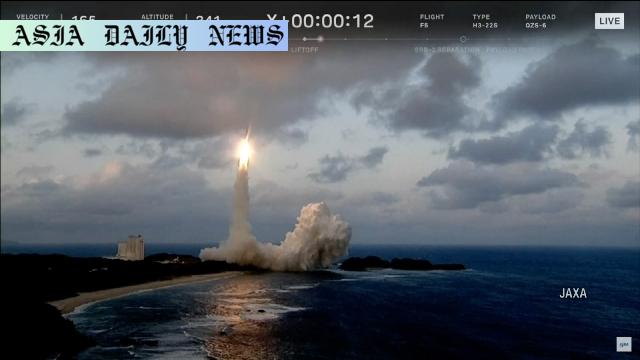Michibiki: Japan plans to expand its satellite positioning system to seven satellites for self-reliance and advanced services.
Michibiki: Japan successfully launched the H3 rocket carrying its satellite.
This marks a significant improvement after the H3 rocket failed in 2023.
Japan aims to expand its positioning system to 7 satellites to reduce dependency on foreign systems.
The system enhances earthquake alerts and aids navigation for various technologies like smartphones and vehicles.

Japan Achieves Another Milestone in Its Space Program
Japan has successfully launched another Michibiki satellite, cementing its position as a formidable player in the space industry. The satellite was carried into orbit by the H3 rocket, which took off from the Tanegashima Space Center in Kagoshima Prefecture, southwestern Japan, at 5:30 p.m. on Sunday. Approximately 30 minutes after its launch, the satellite detached seamlessly from its launch vehicle, signaling a flawless mission. This success highlights Japan’s continued commitment to building its own satellite positioning network.
The Michibiki Satellite Positioning System
The Michibiki project, often dubbed as Japan’s version of the Global Positioning System (GPS), has been in operation with four satellites orbiting Earth. This system plays a crucial role in providing accurate positioning information used in various technologies, including smartphones, car navigation systems, and more. The addition of this new satellite underlines Japan’s ambition to optimize its satellite network further, aiming to increase the number of operational satellites from four to seven. Once completed, this advanced network will allow Japan to operate independently of foreign systems, ensuring self-reliance and security in critical positioning services.
A Safer and More Reliable System
The Michibiki system has unique applications beyond navigation. It plays a pivotal role in disaster management by distributing alerts for earthquakes and other emergencies to areas that may be beyond the reach of conventional radio communications. This added functionality makes the system invaluable in Japan, a country highly prone to natural disasters like earthquakes and tsunamis. By adding more satellites, Japan ensures better coverage and reliability, cementing its role as a leader in leveraging technology for public safety.
A Historic Turnaround for the H3 Rocket
Notably, this latest success comes on the heels of a failed H3 rocket launch in 2023. Japan’s aerospace industry worked tirelessly to address the issues, marking this as the fourth consecutive successful launch of the H3 rocket. This achievement demonstrates the resilience and expertise of Japan’s space program, underscoring its ability to learn from setbacks and emerge stronger. The improvement in the H3 rocket not only boosts confidence in the country’s space capabilities but also opens the doors for future innovations in rocket technology.
Looking Ahead: The Impact of Seven Satellites
The completion of Japan’s satellite constellation with seven operational Michibiki satellites is set to enhance the country’s technological prowess significantly. With this network, Japan will have a robust system that minimizes reliance on foreign technology while providing unparalleled precision and reliability. This independent system not only ensures secure navigation and positioning services but also gives Japan strategic advantages in various fields like defense, transportation, and disaster management.
The Broader Implications
Japan’s strides in space technology highlight its commitment to self-reliance and innovation. The successful launch of the Michibiki satellite reinforces the country’s standing in the global space community, showing its capability to compete with giants like the United States, China, and the European Union. Furthermore, the improvements in the H3 rocket demonstrate the resilience and forward-thinking nature of Japan’s aerospace industry.
Conclusion
The latest Michibiki satellite launch is a testament to Japan’s ambition and capability to achieve technological independence. By expanding its positioning system and upgrading its rockets, the country is investing in a future where it is less dependent on foreign technologies for critical services. As Japan moves closer to its goal of deploying seven satellites, it establishes a critical infrastructure that serves not just technological advancement but also public safety and national security.
Commentary
A Remarkable Leap Towards Self-Reliance
Japan’s continued development of the Michibiki satellite system demonstrates its commitment to achieving technological self-reliance. In an era where geopolitical tensions often affect access to critical infrastructure, having an independent system ensures that Japan remains unaffected by external factors. This strategic development is not only impressive but also essential for a country that heavily relies on precise data for various applications like navigation, disaster management, and communication.
The Importance of Resilience
What stands out in this achievement is the resilience demonstrated by Japan’s aerospace industry. The ability to recover from the 2023 H3 rocket failure and deliver four consecutive successful launches is no small feat. It showcases the immense dedication and technical expertise of Japanese engineers and scientists. Such milestones are a reminder of how failure can be an integral stepping stone toward success when approached with resolve and innovation.
Japan’s Role in the Global Space Race
With this recent development, Japan underscores its position as a significant participant in the global space race. While nations like the United States and China often dominate headlines, Japan’s achievements through projects like Michibiki serve as a compelling example of how smaller nations can excel through focus and collaboration. The successful satellite launch not only highlights Japan’s technological prowess but also brings attention to its ability to contribute meaningfully to global advancements in space exploration and satellite technology.
A Glimpse Into the Future
As Japan edges closer to completing its constellation of seven satellites, the nation paves the way for a future of robust innovation and security. The Michibiki system’s dual function of providing navigation services and disaster alerts ensures that it remains deeply integrated with public safety. This positions Japan uniquely as a leader in leveraging space technology for societal benefit, making this milestone a win not only for Japan but also for the global community.


